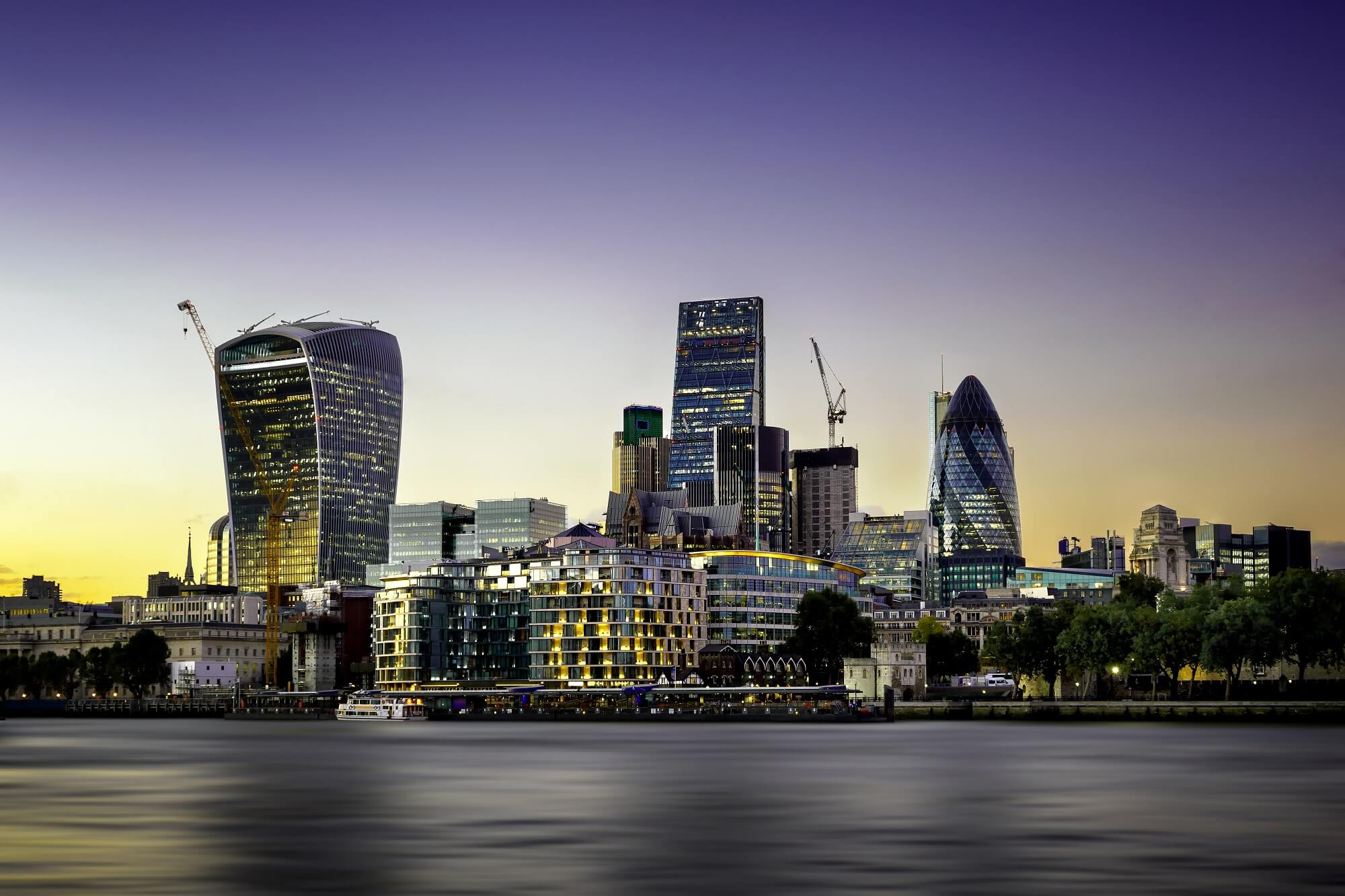 In this article, we take a look at the business evolution of London and what types of business we might expect to flourish soon. But to better understand this phenomenal economic growth, it’s essential to know how the shape and population of London have evolved since the earliest of times.
In this article, we take a look at the business evolution of London and what types of business we might expect to flourish soon. But to better understand this phenomenal economic growth, it’s essential to know how the shape and population of London have evolved since the earliest of times.
How the Population and Evolution of London is Shaped by Business
London was founded by the Romans and confined to one square mile until the seventeenth century. Believe it or not, the city was even abandoned in 410AD, and many farmsteads were built in places such as Hampton, Enfield and Chelsea. What’s more, the Great Fire left almost nothing behind in 1666, and it was another century before the population, structure and notoriety of London began to soar. So that you know, the capital city has a population of 8.9 million and a population density of more than 4,500 people per square kilometre. However, it was only during the mid-1700s when this population began rising to more than two million. Another century later, the London Underground was opened, which meant that residents were able to leave the crowded city for suburban areas. With this in mind, the population was able to rise to more than six million people and then peaked at 8.5 million in the 1940s. But what can we take from these trends in terms of the evolution of business? Well, in modern times, this high population density is due to the relocation of natives from rural areas, and the influx of migrant workers pre-Brexit. More specifically, London is densely populated because of the number of job opportunities, schools and colleges, not to mention the endless lineup of amenities and attractions throughout the city. When you combine these factors with the benefits mentioned above of starting a business here, we can know precisely why London is one of the largest economies in the world.The Phenomenal Economic Growth of London
According to recent studies, London accounts for 17% of the total GDP in Great Britain and continues to thrive in the realms of trade and commerce. While manufacturing, construction, wholesale, tourism and healthcare remain strong, finance leads the way. The financial sector is by far the most dominant with 7.5% of the country’s GDP and more than two million in terms of workforce. You see, London is a major centre for foreign exchange trade and an overwhelming number of financial institutions. From Barclays and HSBC to CitiBank and PWC, these finance giants are visible on every corner. What’s more, the London Stock Exchange is home to thousands of companies and responsible for one-third of all transactions across the globe. Now, that’s not to say the financial sector is the only one to prosper. After all, 20% of the best selling drugs in the world are manufactured in the UK and top pharmaceutical companies such as GlaxoSmithKline, Unilever and AstraZeneca are based in London. Moreover, BP and Shell are busy propping up the oil and gas industry, while Tesco, Halfords and Sainsburys dominate a very healthy retail sector. As if that’s not enough, the tourism sector in London is recognised as having high growth potential and tourists spend an estimated £15 million per year in the capital. For this reason, the London plan is focused on developing the city’s image as a major tourism destination.
London is also a vibrant centre for law, design, fashion, media, and film. As if that’s not enough, technology is one of the fastest-growing sectors in recent years and a study at Oxford Research predicts the tech sector will generate 46,000 jobs by the year 2024.
And that’s just part of the story.
For instance, Green Plant Productions is a waste removal company and one of the largest in the United Kingdom with an annual turnover above £30 billion. Also, Lotus Leisure Limited is a twenty-year-old vehicle rental specialist with an equally impressive turnover of £18 billion last year.
Meanwhile, small and medium-sized enterprises form the backbone of the economy in London and in light of the potential for growth in every sector, many experts suggest that now is the perfect time for graduates, entrepreneurs and startups to take advantage of everything that London has to offer a new business.
Now, that’s not to say the financial sector is the only one to prosper. After all, 20% of the best selling drugs in the world are manufactured in the UK and top pharmaceutical companies such as GlaxoSmithKline, Unilever and AstraZeneca are based in London. Moreover, BP and Shell are busy propping up the oil and gas industry, while Tesco, Halfords and Sainsburys dominate a very healthy retail sector. As if that’s not enough, the tourism sector in London is recognised as having high growth potential and tourists spend an estimated £15 million per year in the capital. For this reason, the London plan is focused on developing the city’s image as a major tourism destination.
London is also a vibrant centre for law, design, fashion, media, and film. As if that’s not enough, technology is one of the fastest-growing sectors in recent years and a study at Oxford Research predicts the tech sector will generate 46,000 jobs by the year 2024.
And that’s just part of the story.
For instance, Green Plant Productions is a waste removal company and one of the largest in the United Kingdom with an annual turnover above £30 billion. Also, Lotus Leisure Limited is a twenty-year-old vehicle rental specialist with an equally impressive turnover of £18 billion last year.
Meanwhile, small and medium-sized enterprises form the backbone of the economy in London and in light of the potential for growth in every sector, many experts suggest that now is the perfect time for graduates, entrepreneurs and startups to take advantage of everything that London has to offer a new business.
Factors to Consider Before Starting a Business in London
It’s essential to consider specific questions when it comes to starting a new business in any given city. For example, will this venture be profitable in ten or twenty years? Does this product or service have the potential to withstand times of economic uncertainty?
On the other hand, it makes sense to remember that qualifications or experience may not be necessary, but specific training and skills are most often required to succeed. Also, startup capital is never easy to raise but always easy to spend. With this in mind, it’s less stressful to proceed with ventures that rely on hard work as opposed to capital.
But what types of business opportunities in London exist?
It depends on the lay of your skills, experience or passion. However, there are certain areas of business that seem to be moving faster than others.
Cannabidiol (CBD) Industry – CBD is the phytocompound, also called cannabidiol. CBD has influenced people’s wellbeing by providing relief from symptoms of chronic illness and extreme pain. CBD products are gaining immense traction, and the CBD industry is expected to eclipse £1 billion in the UK over the next five years. It’s a market that needs more regulation, but honest players seem to be benefiting from this increase in demand.
Eco-Beauty Industry - environmental awareness is providing opportunities to newcomers in the beauty industry. That is to say, more and more customers are turning away from major brands and choosing smaller businesses that focus on sustainability and alternative products.
Connected Fitness - As life becomes busier, people have less time to use the gym. For this reason, convenient solutions are a major focus in the fitness industry with apps and home workout sessions being a particular focus for new businesses.
These are just a few trends and examples of opportunities that can help identify niche areas in an economy which is already overflowing with companies/ideas.
For example, will this venture be profitable in ten or twenty years? Does this product or service have the potential to withstand times of economic uncertainty?
On the other hand, it makes sense to remember that qualifications or experience may not be necessary, but specific training and skills are most often required to succeed. Also, startup capital is never easy to raise but always easy to spend. With this in mind, it’s less stressful to proceed with ventures that rely on hard work as opposed to capital.
But what types of business opportunities in London exist?
It depends on the lay of your skills, experience or passion. However, there are certain areas of business that seem to be moving faster than others.
Cannabidiol (CBD) Industry – CBD is the phytocompound, also called cannabidiol. CBD has influenced people’s wellbeing by providing relief from symptoms of chronic illness and extreme pain. CBD products are gaining immense traction, and the CBD industry is expected to eclipse £1 billion in the UK over the next five years. It’s a market that needs more regulation, but honest players seem to be benefiting from this increase in demand.
Eco-Beauty Industry - environmental awareness is providing opportunities to newcomers in the beauty industry. That is to say, more and more customers are turning away from major brands and choosing smaller businesses that focus on sustainability and alternative products.
Connected Fitness - As life becomes busier, people have less time to use the gym. For this reason, convenient solutions are a major focus in the fitness industry with apps and home workout sessions being a particular focus for new businesses.
These are just a few trends and examples of opportunities that can help identify niche areas in an economy which is already overflowing with companies/ideas.
Leave a Comment